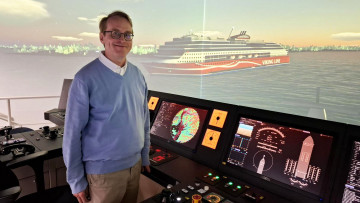Psychologist Jukka Häkkinen Explores the Challenges of Remote Pilotage
"I’ve driven an outboard motor in a small rowboat at our summer cottage," jokes Doctor of Psychology Jukka Häkkinen when asked about his seafaring experience prior to his current research. Today, however, Häkkinen is working with entirely different kinds of vessels and questions.
In September 2024, Häkkinen began working as a project researcher in the Remote Pilotage MVP (Minimum Viable Product) research project, which focuses on the human factors in remote pilotage. The project is coordinated by Novia University of Applied Sciences and investigates under what conditions remote pilotage can be implemented safely and efficiently in the future. The project is funded by Business Finland.
How is situational awareness shared remotely?
A key challenge in remote pilotage is the lack of shared situational awareness when the ship’s crew and the pilot are not in the same location.
“It’s much harder to create a common situational picture when you can’t point or react directly to another person’s actions,” Häkkinen explains.
In remote pilotage, it is crucial what kind of information is transmitted from the ship to the pilot at the remote pilotage station. Häkkinen is particularly interested in understanding what kind of information is needed at sea in various situations, how decisions are made based on that information, and how future developments are anticipated.
Häkkinen also studies the eye movements of pilots.
"Where they look reveals what information they need for their actions and thinking. That data gives insights into their mental models. From this, we can conclude what information they require to make sound decisions."
Focus on trust and communication
The research delves into how communication, trust, and mutual understanding are built.
“Pilots are very experienced professionals who are certainly capable of adapting to new working models. The challenge lies in creating a system that supports their work,” Häkkinen says.
The implementation of remote pilotage requires certification of ships and crews, and the system will initially be applied to the easiest fairways.
Jukka Häkkinen is an experienced researcher who previously worked at the Faculty of Medicine at the University of Helsinki, in the Department of Psychology and Logopedics. He has studied topics such as visual information processing in the brain, decision-making, interaction with technology, and has published books on conspiracy theories and the psychology of hallucinations.
Häkkinen was informed about the open research position at Novia, and his interest was sparked immediately.
“Conducting psychological research related to maritime operations sounded incredibly interesting. Additionally, Novia offers simulators, a multidisciplinary team, and excellent facilities in every respect,” says Häkkinen.
